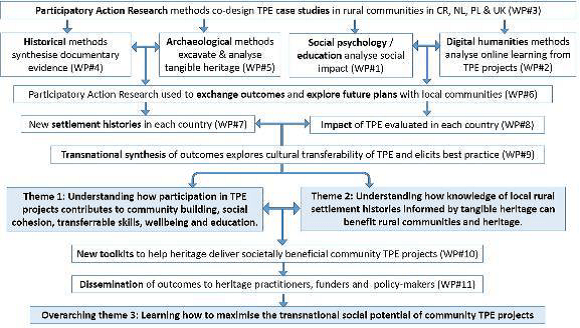In order to address the above research questions, CARE-MSoC will pursue the following objectives to carry out 12 case studies of community TPE in four different countries and synthesise the outcomes:
- Create 12 participatory action groups including local residents and young people in 12 different inhabited rural settlements across the four partner European countries (the UK, the Netherlands, the Czech Republic and Poland) who will work with university researchers and heritage practitioners in researching, planning and analysing community archaeology TPE projects within local villages.
- Run 12 research-engaged community archaeological TPE projects each completing up to 50 test pits over two years (c. 600 test pits in total over the life of the project) involving c. 2,500 members of wider publics.
- Collect quantitative and qualitative feedback data on the impact of the project in each settlement on participants, local people, communities and heritage using methodologies from community archaeology, public engagement, social psychology and digital humanities.
- Write new histories of each settlement using the excavation data combined with local knowledge and desk-based assessment of documentary evidence and methodologies from medieval studies, archaeology and landscape biography to create new local historical narratives which connect the contemporary place and people with the tangible heritage and landscape biography, contextualised with reference to wider national and international historical narratives.
- Share the new histories with host communities exploring the relevance and implications of the new perspectives and explore with rural populations how the new historical knowledge and tangible heritage assets might be able to deliver further legacy benefits to the community in the future.
- Analyse the impact feedback data in order to advance understanding of the mechanisms, processes and factors which affect success rates in achieving wider societal benefits, focussing on the projects’ impact in raising educational aspirations, improving social mobility and community self-esteem, strengthening social cohesion, increasing opportunities for fulfilling locally-based post-work activity and mitigating the impact of public sector funding cuts while also protecting heritage.
- Complete a transnational comparative analysis of the impact analyses from four countries in order to identify the adaptations needed for beneficial societal outcomes to be achieved in different social, cultural and historical contexts and elicit principles underpinning best practice.
- Publish the outcomes of research in each settlement in appropriate academic publications and present them to heritage practitioners at professional conferences.
- Communicate the research outcomes to heritage policy-makers and funders in order to inform evidence-based decision-making by funding bodies, heritage policy makers and heritage curators considering whether to enact changes to cultural heritage practice and policy to make community TPE more widely available in the future.
- Develop toolkits to enable heritage practitioners to deliver successful TPE projects indifferent social contexts in the future in order to maximise beneficial impacts and contextualise local project outcomes within international research frameworks.

